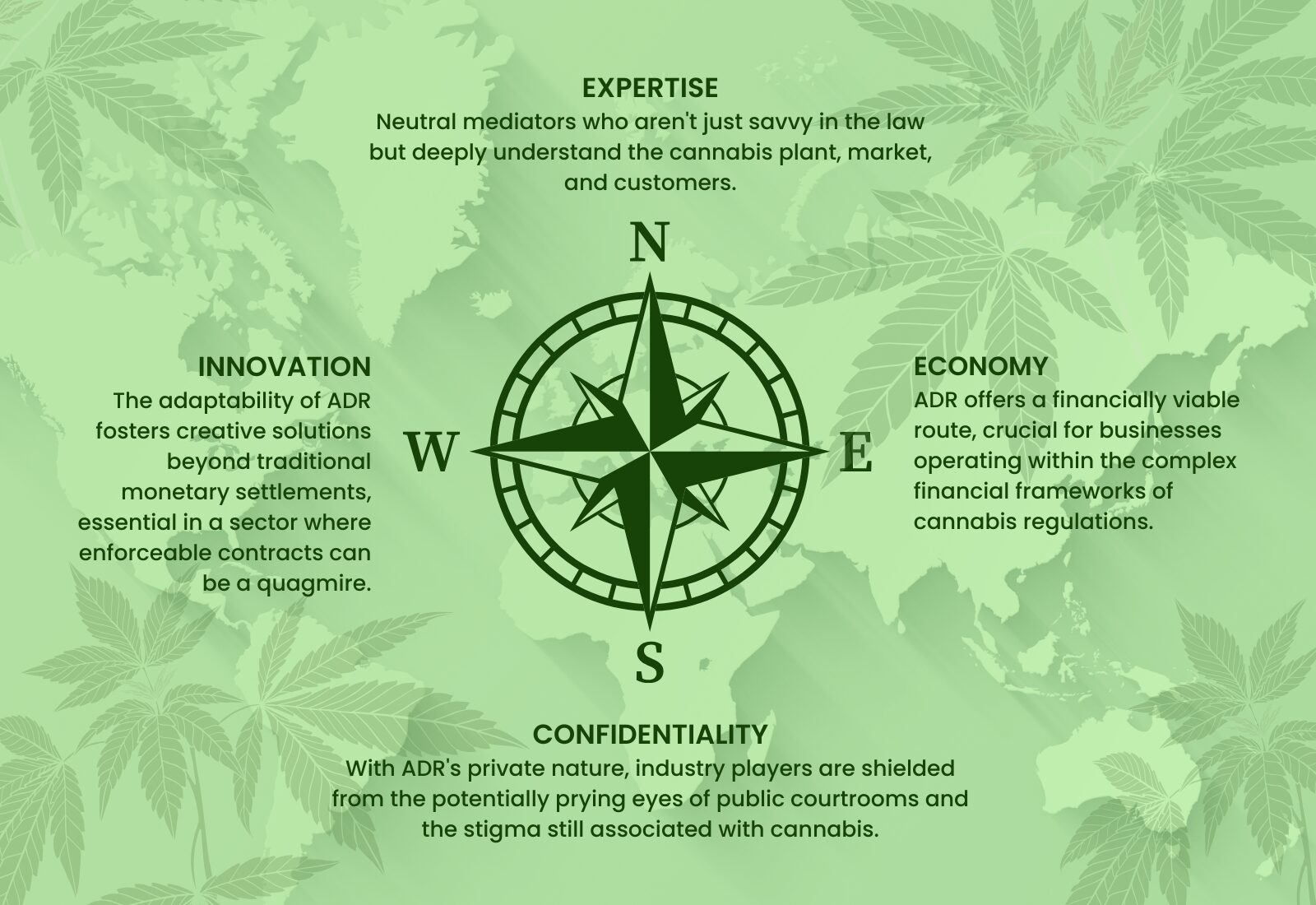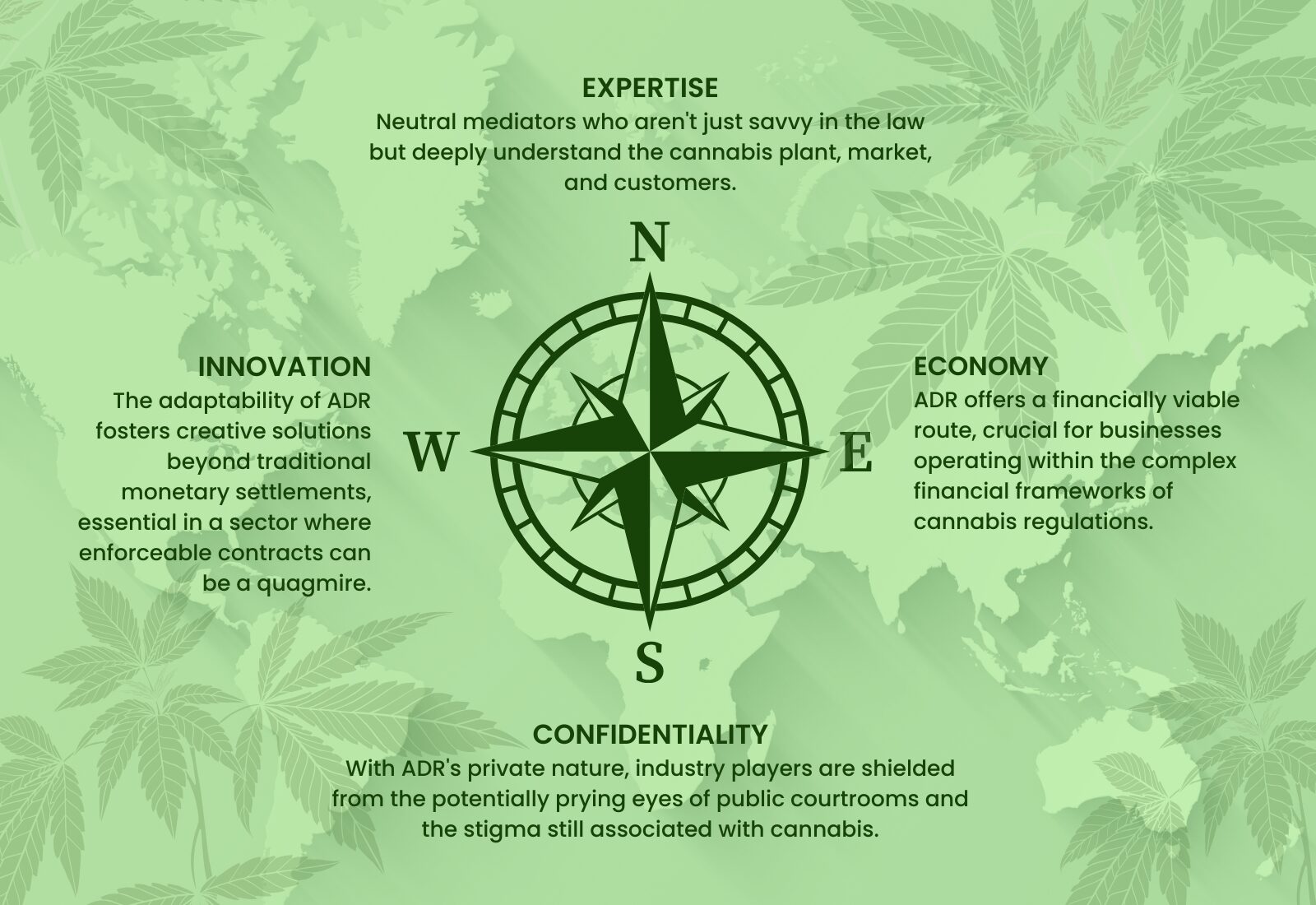
06 Dec ADR’s Vital Role in Cannabis Industry Disputes

As a mediator specializing in cannabis-related conflicts, I’ve witnessed firsthand the increasing need for Alternative Dispute Resolution (ADR) in this rapidly evolving industry. With three-quarters of Americans now living in states where recreational or medical marijuana use is legal, the landscape of potential disputes has expanded dramatically. Currently, 24 states and the District of Columbia have legalized recreational marijuana, while 14 states permit its use for medicinal purposes. Yet cannabis with more than .3 percent THC by dry weight remains illegal under federal law. This has created a complex legal environment, ripe for controversy.
Participants in the cannabis industry deal with a wide array of legal disputes. These include conflicts over intellectual property, mergers and acquisitions, and the ownership and management of cannabis farms, processing and distribution companies, and dispensaries. We’re seeing an increase in employee claims, personal injury cases, water rights disagreements, and land use and environmental regulation violations. Violations of the ADA and federal safety laws, local code enforcement targeting landlords, and conflicts between neighboring farmers over odors and pollen drift are all part of the growing list of legal issues in this sector.
The cannabis industry faces unique challenges when it comes to resolving disputes through traditional legal channels. Federal courts are generally unavailable due to cannabis’s status as a Schedule I drug under the Controlled Substances Act. State laws are often evolving and conflicting. Lingering stigma can affect litigation outcomes with state court judges and juries. And the cost and outcome of litigation can destroy cannabis companies, which typically have tight cash flow, limited assets, and a lot of debt.
Recent high-profile cases among competitors highlight these challenges. We’ve seen lawsuits accusing state-licensed labs of providing false, favorable test certifications to attract business. Disputes over dispensary licensing processes have emerged, often halting the entire procedure for all applicants.
Given these circumstances, ADR has become not just an option, but a necessity for the cannabis industry. ADR typically costs less than traditional litigation, offering a more economical path to resolution. Unlike public court proceedings, ADR provides a degree of confidentiality that appeals to cannabis investors wary of public scrutiny. As regulations and market dynamics evolve, mediation’s adaptability allows it to address novel disputes effectively. Neutrals with specific expertise with cannabis industry can help parties develop solutions that address the needs of all involved, often preserving business relationships and even laying the groundwork for future collaboration. Even in competitive situations, dispute resolution can help stabilize market and regulatory issues, benefiting all industry participants.
The best mediators for cannabis disputes are neutrals who truly know the business, its products and customers, the regulatory and financial milieu, and the plant itself. As I write this, we are seeing growing tension between those in the highly regulated and taxed state marijuana markets and those in the federally legal hemp market. Many disputes involve subjective judgments, such as the rejection of cannabis flower or oil based on quality, while others stem from objective testing and cannabinoid profiles. Having to educate a neutral about the subject matter during mediation is inefficient and dramatically reduces the prospect of settlement.
Experienced neutrals can guide parties toward innovative resolutions that may not involve monetary settlements. These creative solutions can potentially avoid insolvency or unsatisfiable judgments that might result from years of litigation. This approach is particularly valuable in an industry where traditional financial remedies may be exceedingly complicated or completely unavailable because of the law or the difficulty enforcing contracts.
As we move forward, several factors may impact dispute resolution in the cannabis industry. The potential rescheduling of cannabis containing significant quantities of THC to Schedule III by the federal government could improve the financial situation for cannabis businesses by allowing them to write off most business costs. However, this would not fully align state recreational cannabis laws with federal regulations. The evolving landscape of hemp-based products with chemically derived psychotropic properties may lead to unfair business practices claims between the licensed high-THC cannabis industry and the hemp industry.
In conclusion, as the cannabis industry continues to grow and face complex legal challenges, ADR stands out as an indispensable tool for resolving disputes efficiently, creatively, and with an eye toward the unique needs of this dynamic sector. Its flexibility and ability to provide tailored solutions make it particularly well-suited to navigate the complex and rapidly changing landscape of cannabis law and business. Those who effectively utilize alternative dispute resolution methods will be better positioned to address legal challenges efficiently and successfully. For cannabis entrepreneurs, investors, and legal professionals, understanding and leveraging ADR may well be the key to successfully navigating the complex legal terrain of this burgeoning industry.
Note: This post was first published October 17, 2024 on the Alger ADR Blog.


No Comments